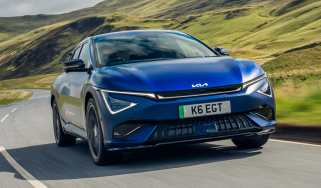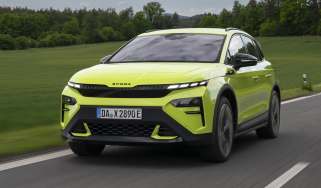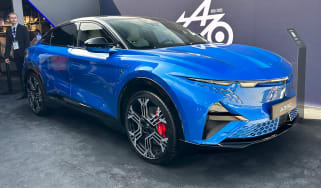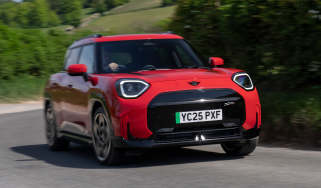ZEV mandate explained: What is it and how does it affect performance cars?
In 2025 28 per cent of a manufacturer’s sales will need to be all-electric, so will exciting ICE cars survive?

We’ve all heard the term ‘ZEV mandate’ being bandied about and it’s all too easy to think it’s not important if you’re not in the market for an electric car. But when Toyota says we’re not going to be getting what looks like the best Supra of its generation in the UK because of the ZEV it’s time to sit up and take notice.
To understand why this is the case first you must understand what the Zero Emission Vehicle (ZEV) mandate is all about. It came into law in the UK at the beginning of 2024 and is set out in the government’s weighty 137-page ‘Zero Emission Vehicle Mandate and CO₂ Regulations’ tome. It states the proportion of car sales in the UK must be tailpipe ZEVs – i.e. Battery Electric Vehicles (BEV) – in each of the years leading up to 2030, and ultimately the ban on petrol- and diesel-powered new car sales by 2035.
The target for 2024 was 22 per cent ZEV sales, and UK new car deliveries missed this by quite a margin with BEVs accounting for 19.6 per cent of sales. Total sales in 2024 were nigh on two million vehicles so the manufacturers missed the target by around 50,000. And it’s not going to get any easier to meet the government’s targets as 28 per cent of all sales in 2025 must be ZEVs, 33 per cent in 2026, 38 per cent in 2027, 52 per cent in 2028, 66 per cent in 2029 and 80 per cent in 2030.
Manufacturers are keen to hit these targets as failing to do so could result in a fine of £15,000 per vehicle sold outside of their target. So, a manufacturer that sells just 2000 cars that fall outside of their target could be liable for a fine of £30 million. However, the regulations aren’t quite as cut and dried as that as a manufacturer’s CO2 output is also taken into account and it can also buy credits from other manufacturers who are hitting their ZEV target.

While the ultimate aim is to eliminate all tailpipe emissions the regulations are designed to encourage manufacturers to reduce their CO2 outputs with each company having a target based on their 2021 figures. Thus, if a manufacturer fails to hit their BEV target they can escape a fine if their average CO2 output has fallen significantly as this can be offset against their ZEV target.
To protect smaller manufacturers the ZEV doesn’t apply (in terms of BEV sales) to companies with sales of less than 2500 units a year so Ferrari, for example, will be fine as it sold less than 1000 cars in the UK last year. This 2500 sales figure is likely to drop in the coming years so even manufacturers with low volumes can’t ignore the ZEV completely. However, many companies selling cars in the UK missed their ZEV targets which means they are having to rely on the low CO2 outputs of their range to avoid ZEV fines.
> 2025 VED car tax: what you'll be paying
With regard to the type of cars we revel in at evo the problem is that not only do these cars tend to be powered by internal combustion engines they also have CO2 outputs at the higher end of the spectrum. Sales of these types of cars don’t count towards ZEV sales and push up CO2 levels of the range.
Some manufacturers seem to have walked the ZEV tightrope better than others and if they have a broad product portfolio then so much the better. If we look at BMW for example, then it’s already hit its ZEV target for 2024 as nearly 27 per cent of its UK sales in 2024 were BEVs. At the same time, it sold a large number of PHEVs which generally score very well in WLTP tests with regard to CO2 outputs. Those two factors combined means it’s more than happy to sell a range of M cars without battery assistance and high CO2 figures.

Contrast this with Toyota which has a restricted BEV line-up in the UK of just the bZ4X which will be joined by the Urban Cruiser later this year. It will have missed its ZEV sales targets in 2024 but will make up plenty of ground on its CO2 targets with its range of low CO2-emitting PHEVs and self-charging hybrids. Despite this there’s not much wriggle room to be selling limited edition Supras with high CO2 outputs as the possibility of having to pay the government £15,000 for each one sold doesn’t make financial sense.
So, what does the future have in store for the performance car? If BEV sales pick up then it will be easier for manufacturers to hit their targets which should leave room for more evo cars, but if the reverse happens then we may find more manufacturers will cut their performance offerings. Either way, it may well be the case that more and more performance cars follow the PHEV route thanks to their far lower CO2 outputs in WLTP testing. To return to the BMW example let’s look at the M3 and the M5. Both have four doors and five seats and can hit 62mph from rest in 3.5sec… but the M3 (ICE only) emits 230g/km while the M5 (PHEV) emits just 43g/km. From a ZEV perspective BMW would much rather you bought an M5 than an M3.
> The ZEV mandate killed the Toyota Supra
Recent lobbying by several car manufacturers may have changed the ZEV ground rules though. These companies have suggested to the UK government that they will either close UK plants or not open new ones unless the rules are relaxed somewhat. The business secretary, Jonathan Edwards, recently told The Times that the Labour cabinet has agreed on ‘a substantial change of policy’ with regard to the ZEV mandate and we’re expecting an announcement on this soon. Above all else vehicle manufacturers would like clarity of the rules and regulations they have to follow… and hopefully this can lead to a stay of execution for the ICE performance car.







